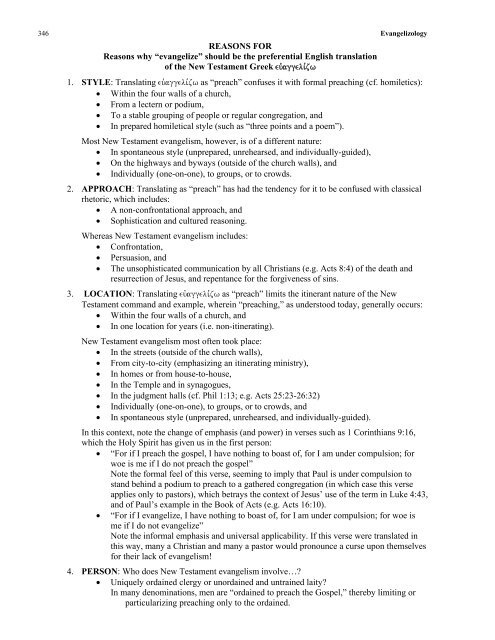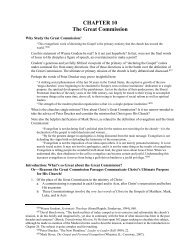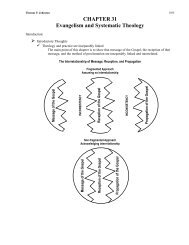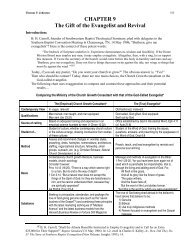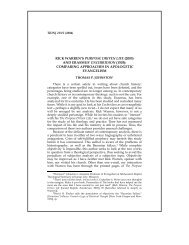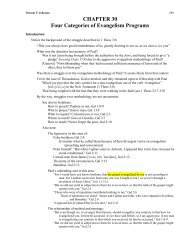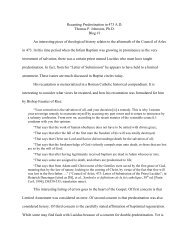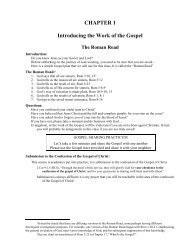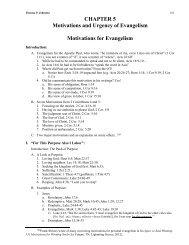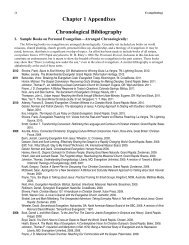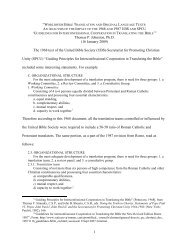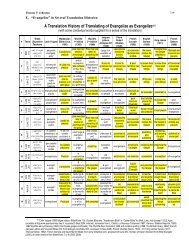CHAPTER 7 Defining Evangelizing - Evangelism Unlimited
CHAPTER 7 Defining Evangelizing - Evangelism Unlimited
CHAPTER 7 Defining Evangelizing - Evangelism Unlimited
You also want an ePaper? Increase the reach of your titles
YUMPU automatically turns print PDFs into web optimized ePapers that Google loves.
346 Evangelizology<br />
REASONS FOR<br />
Reasons why “evangelize” should be the preferential English translation<br />
of the New Testament Greek euvaggeli,zw<br />
1. STYLE: Translating euvaggeli,zw as “preach” confuses it with formal preaching (cf. homiletics):<br />
Within the four walls of a church,<br />
From a lectern or podium,<br />
To a stable grouping of people or regular congregation, and<br />
In prepared homiletical style (such as “three points and a poem”).<br />
Most New Testament evangelism, however, is of a different nature:<br />
In spontaneous style (unprepared, unrehearsed, and individually-guided),<br />
On the highways and byways (outside of the church walls), and<br />
Individually (one-on-one), to groups, or to crowds.<br />
2. APPROACH: Translating as “preach” has had the tendency for it to be confused with classical<br />
rhetoric, which includes:<br />
A non-confrontational approach, and<br />
Sophistication and cultured reasoning.<br />
Whereas New Testament evangelism includes:<br />
Confrontation,<br />
Persuasion, and<br />
The unsophisticated communication by all Christians (e.g. Acts 8:4) of the death and<br />
resurrection of Jesus, and repentance for the forgiveness of sins.<br />
3. LOCATION: Translating euvaggeli,zw as “preach” limits the itinerant nature of the New<br />
Testament command and example, wherein “preaching,” as understood today, generally occurs:<br />
Within the four walls of a church, and<br />
In one location for years (i.e. non-itinerating).<br />
New Testament evangelism most often took place:<br />
In the streets (outside of the church walls),<br />
From city-to-city (emphasizing an itinerating ministry),<br />
In homes or from house-to-house,<br />
In the Temple and in synagogues,<br />
In the judgment halls (cf. Phil 1:13; e.g. Acts 25:23-26:32)<br />
Individually (one-on-one), to groups, or to crowds, and<br />
In spontaneous style (unprepared, unrehearsed, and individually-guided).<br />
In this context, note the change of emphasis (and power) in verses such as 1 Corinthians 9:16,<br />
which the Holy Spirit has given us in the first person:<br />
“For if I preach the gospel, I have nothing to boast of, for I am under compulsion; for<br />
woe is me if I do not preach the gospel”<br />
Note the formal feel of this verse, seeming to imply that Paul is under compulsion to<br />
stand behind a podium to preach to a gathered congregation (in which case this verse<br />
applies only to pastors), which betrays the context of Jesus’ use of the term in Luke 4:43,<br />
and of Paul’s example in the Book of Acts (e.g. Acts 16:10).<br />
“For if I evangelize, I have nothing to boast of, for I am under compulsion; for woe is<br />
me if I do not evangelize”<br />
Note the informal emphasis and universal applicability. If this verse were translated in<br />
this way, many a Christian and many a pastor would pronounce a curse upon themselves<br />
for their lack of evangelism!<br />
4. PERSON: Who does New Testament evangelism involve…?<br />
Uniquely ordained clergy or unordained and untrained laity?<br />
In many denominations, men are “ordained to preach the Gospel,” thereby limiting or<br />
particularizing preaching only to the ordained.


